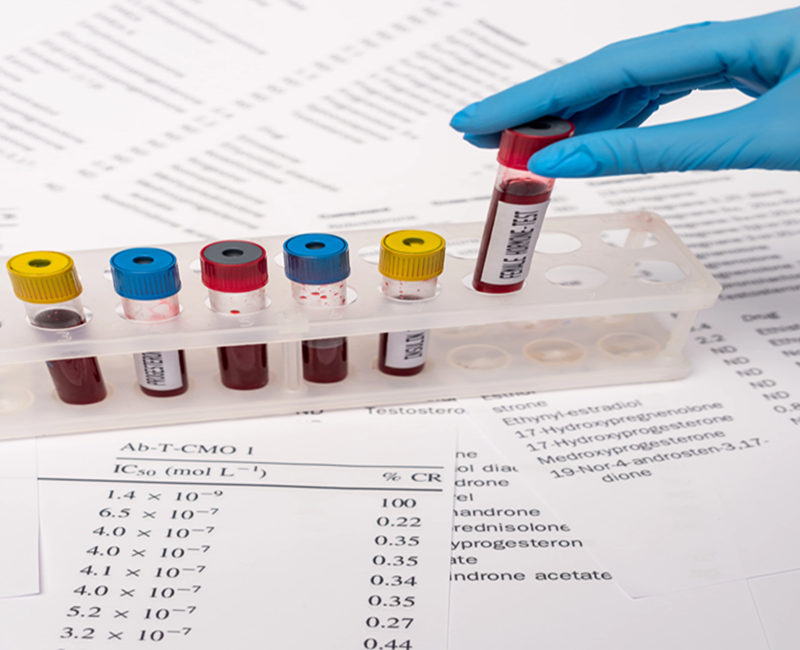
14 Jan Testing Hormones for Food Sensitivities: What You Need to Know
The root cause of your health problems can often be attributed to reactions to food. This may cause symptoms such as digestive problems, skin conditions, migraines, anxiety, and fatigue. These reactions to foods can be based on immune reactions, acidity, and blood type or they can be specific to your diagnosis.
There are several ways your immune system can react to foods. Food “allergies” come from IgE reactions in your immune system. The symptoms occur immediately after consuming the food and could include hives, throat swelling, wheezing, swollen lips or tongue. Common foods that can cause IgE reactions are peanuts, shellfish, tree nuts, fish, eggs, and dairy. Food allergies can be tested with a skin prick or blood test and may require a prescription to carry an epi-pen in case of reactions.
Food “sensitivities” trigger IgG reactions in the immune system. These are also called “delayed food hypersensitivities” or “food intolerance. IgG symptoms may occur several hours or several days after consuming the food. You body makes a unique IgG (antibody) to match each food (antigen) that you are sensitive to. They bind together, and enter the circulation, meaning that the symptoms can happen in many systems of our health. Testing Hormones for food sensitivities are done through a blood test in a variety of private labs. Food sensitivities may also trigger auto-immune reactions and could also be related to non-alcoholic fatty liver disease. Gluten, dairy and eggs are common food sensitivities found in patients with auto-immune diseases such as thyroid, irritable bowel syndrome, fibromyalgia and MS.
Increasing numbers of patients are finding that they are sensitive to wheat or gluten. Gluten is a protein found in wheat, oats, barley, and rye. Celiac disease is a condition that is significantly impacted by eating gluten. In this situation, it’s an IgA reaction. IgA reactions occur in the inner linings of our body, such as the intestinal walls. You can test for IgA reactions to gluten with a blood test from your medical doctor or naturopath. If you clearly have symptoms after eating wheat or gluten, but the test for allergies and sensitivities looks normal, it could be that you are reacting to genetically modified versions of wheat or the glyphosate chemicals that are sprayed on grains in our farming process. Some patients react to wheat locally but are tolerant of wheat products in Europe where farming is more organic.
Food can be harmful in other ways, beyond the immune system. I ask every patient for their blood type to include this aspect of their chemistry in a nutritional recommendation. There are proteins called lectins in our foods that can cause positive or negative reactions in our red blood cells. You can test your blood type through your medical doctor or naturopath, after which you can eat according to the lists of foods that are harmful, beneficial, or neutral. Eating according to your blood type can often lead to more energy, less inflammation, and some weight loss, and patients can feel the difference in as little as a week.
In our clinic, we can see your red blood cells in live action in a Live Blood Analysis on our microscope, to show you if eating according to your blood type is indicated. Additionally, we offer testing hormones for food sensitivities to provide a deeper understanding of how your body responds to different foods.
Dr. Linda Brown ND, a naturopath in our clinic, tests for food reactions with BIE. BIE is a fast, painless process that helps your body recognize the food or environmental culprits causing your symptoms. It’s especially helpful for seasonal and food reactions – relieving discomfort and bringing your body back into balance. BIE is a great way to identify and treat reactions to foods for kids and people who are afraid of needles.
Bronte Natural Health Clinic is Oakville’s most experienced naturopathic clinic, offering a variety of highly qualified practitioners. Please call 905-825-8787 or email bnhc@rogers.com to book.
- Testing Hormones for Food Sensitivities: What You Need to Know - January 14, 2025
- Boost Digestion Naturally with the Help of Natural Medicines - December 26, 2024
- Natural Hormone Help for Menopause: Effective Solutions for Relief - December 26, 2024

